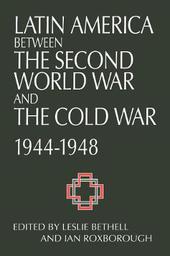
|
Latin America between the Second World War and the Cold War: Crisis and Containment, 1944-1948
Paperback / softback
Main Details
| Title |
Latin America between the Second World War and the Cold War: Crisis and Containment, 1944-1948
|
| Authors and Contributors |
Edited by Leslie Bethell
|
|
Edited by Ian Roxborough
|
| Physical Properties |
| Format:Paperback / softback | | Pages:368 | | Dimensions(mm): Height 229,Width 152 |
|
| ISBN/Barcode |
9780521574259
|
| Classifications | Dewey:980.033 |
|---|
| Audience | | Professional & Vocational | |
|---|
| Illustrations |
Worked examples or Exercises
|
|
Publishing Details |
| Publisher |
Cambridge University Press
|
| Imprint |
Cambridge University Press
|
| Publication Date |
28 February 1997 |
| Publication Country |
United Kingdom
|
Description
This volume aims to establish that the period between World War II and the beginning of the Cold War (1944-5 to 1947-8) represents an important conjuncture in the political and social history of Latin America in the twentieth century. The volume contains an Introduction and a Conclusion by the editors and case studies of eleven of the twenty Latin American republics. Despite differences of political regime and different levels of economic and social development there are striking similarities in the experiences of the majority of the Latin American republics in this period. For most of Latin America it can be divided into two phases. The first, coinciding with the Allied victory in the Second World War, was characterized by three distinct but interrelated phenomena: democratization; a shift to the Left, both Communist and non-Communist; and unprecedented labor militancy. In the second phase, coinciding with the onset of the Cold War and completed almost everywhere by 1948, labor was disciplined by the State and in many cases excluded from politics; communist parties suffered proscription and severe repression; reformist, "progressive" parties moved to the right; the democratic advance was for the most part contained, and in some cases reversed.
Reviews"...what seemed an auspicious moment for social democratic forces soon gave way in most countries to authoritarian repression, restrictions on the left, military coups and conservative consolidation. This illuminating volume analyzes why this occurred, concentrating on the interplay between domestic economic and social factors and the influence of U.S. policy." Foreign Affairs "...the eleven essays in this volume are remarkably even in their high quality...a valuable addition to the relatively sparse historical literature on the early Cold War years in Latin America." Daniel Masterson, The Americas
|